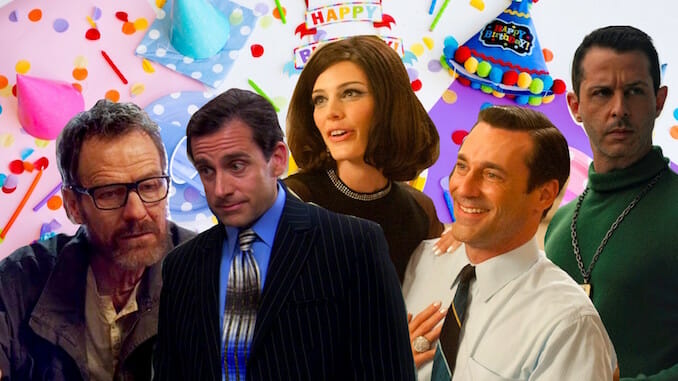Why Do TV’s Leading Men Have Such Horrifying Birthdays?

Despite its surface appearance as a joyous if trite ritual, the birthday party has been known to cause a great deal of social and psychological headaches. Often involving a culmination of the most important people in a person’s life, the event is naturally a treacherous hotspot where bubbling tensions finally boil over. More than that, though, birthday parties are finite markers that locate a person in their own life.
Given all this, it only makes sense that episodes of TV shows that center around a birthday tend to be… intense. (I’m assuming I’m not the only one who physically recoiled at the news that tortured golden boy Kendall Roy was throwing himself a birthday bash in the newest season of Succession).
Within these episodes, revelations are typically made about a characters’ descent into corruption, or their ruin via external forces. And more often than not, they’ll also reveal something unseemly and sinister about the world itself.
Given the weight they carry, it is unsurprising that many of TV’s beloved prestige comedies and dramas have important birthday episodes of their own. From Succession’s already-iconic luxury soirée from hell and The Office’s Michael Scott’s (Steve Carrell) big day that is overshadowed by a coworker’s cancer scare, to Mad Men’s uncomfortable surprise party and the three (three!) birthdays that stamp the sinister arc of Breaking Bad’s Walter White (Bryan Cranston), the birthday episode has the ability to affirm a show’s thematic material in a way that no other episode truly can.
![]()
In many ways, The Office and Mad Men are polar opposites; the former is a half-hour sitcom rooted in excruciating cringe-humor, while the latter is a somber and thoughtful period piece. But when examining the shows’ respective birthday episodes, it becomes clear that their protagonists represent two sides of the same coin. Both businessmen swept up in corporate America, they embody a resistance against the ever-shifting definition of the so-called “modern man.”
On Mad Men, Don Draper’s (Jon Hamm) birthday episode, “A Little Kiss,” comes at the beginning of Season 5. The episode starts with a protest. It’s 1966, and a crowd of people are marching in favor of equal opportunity in employment regardless of race. An old-fashioned man, Don is resistant to the concept of change, and is adamant that things stay the way they are.
And while on first (and second and third) glance, the buffoonish, desperate Michael Scott is nothing like the slick, old-fashioned-drinking womanizer Don Draper, they both represent the same thing: an opposition to change in a modernizing world that threatens to leave them behind. From Season 1 of The Office, the Scranton, Pennsylvania branch of the Dunder Mifflin paper company overseen by Michael Scott is on the precipice of demise. And the obliteration of the paper business is only destined to get worse: in the early 2000s, when The Office is set, the internet was rapidly increasing in popularity, and with it, physical paper was becoming less valuable.
But Michael is still desperate to uphold the ideal of a sales-based workplace, and, ultimately, the modern corporate man. In “Michael’s Birthday,” he fights to be the center of attention, which reflects his daily struggles to persuade his employees of the importance of the “boss” figure in a society where workplace hierarchies are becoming more and more arbitrary. Michael’s bid for the spotlight is ultimately overshadowed by his employee, Kevin (Brian Baumgartner), who is awaiting a potential skin cancer diagnosis. A lack of regard from Michael’s subordinates for his birthday—paired with the fact that the primary thing he is vying for on his birthday is recognition—indicates the fact that, without these hierarchies, Michael would feel utterly displaced in his life.
Unlike Michael, at Don’s birthday party, he is the center of attention; and, unlike Michael, he doesn’t want to be. Don’s new wife, Megan (Jessica Paré), throws him a surprise party against the advice of his co-worker Peggy (Elisabeth Moss), who knows he isn’t fond of being made a fuss over. At the party, Megan performs a provocative dance for Don in front of all of his coworkers. This moment epitomizes Don’s opposition to the changing times, as a birthday present is often a signifier of who a loved one thinks you are. Indeed, while Don consistently embodies the rigid traditionalism and privacy of the 1950s, Megan—particularly via her dance number—symbolizes the freewheeling optimism of the 1960s. And like Michael’s unwillingness to let go of the old-fashioned work model, Don is ultimately unable to coexist with his independent wife.
But an uncomfortable confrontation with the changing times isn’t the only thing Don comes head-to-head with in “A Little Kiss.” The case of his stolen identity (an issue that he seldom acknowledges) is brought up, as this isn’t Don’s real birthday, but rather the birthday of the man whose identity he nabbed ages ago. It is often suggested that, as a person gets older, they get closer to becoming who they really are, and approach their true identity with every passing birthday. And this is true for Don, who, with every opportunity he is given to push back against modernity, evolves more into the white-collar man he has spent the past couple decades posturing as. Similarly, in Breaking Bad, Walter White’s birthdays act as a vehicle that move him toward his true identity, while also existing as distinct markers of the changes in his life that reflect his descent into corruption and evil.
-

-

-

-

-

-

-

-

-

-

-

-

-

-

-

-

-

-

-

-

-

-

-

-

-

-

-

-

-

-

-

-

-

-

-

-

-

-

-

-








































